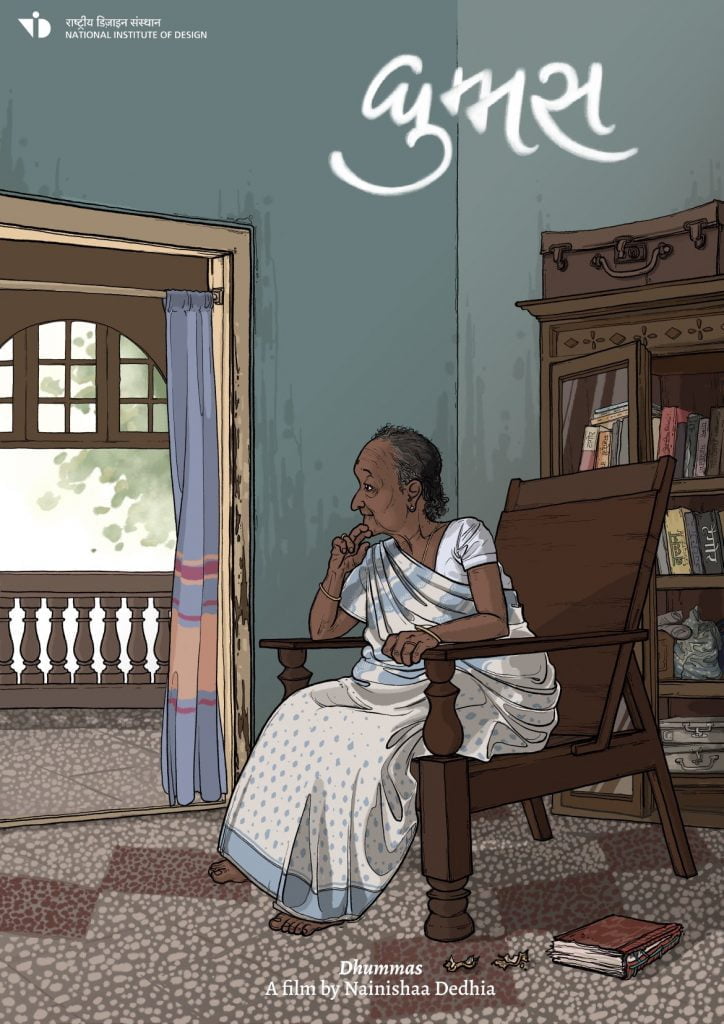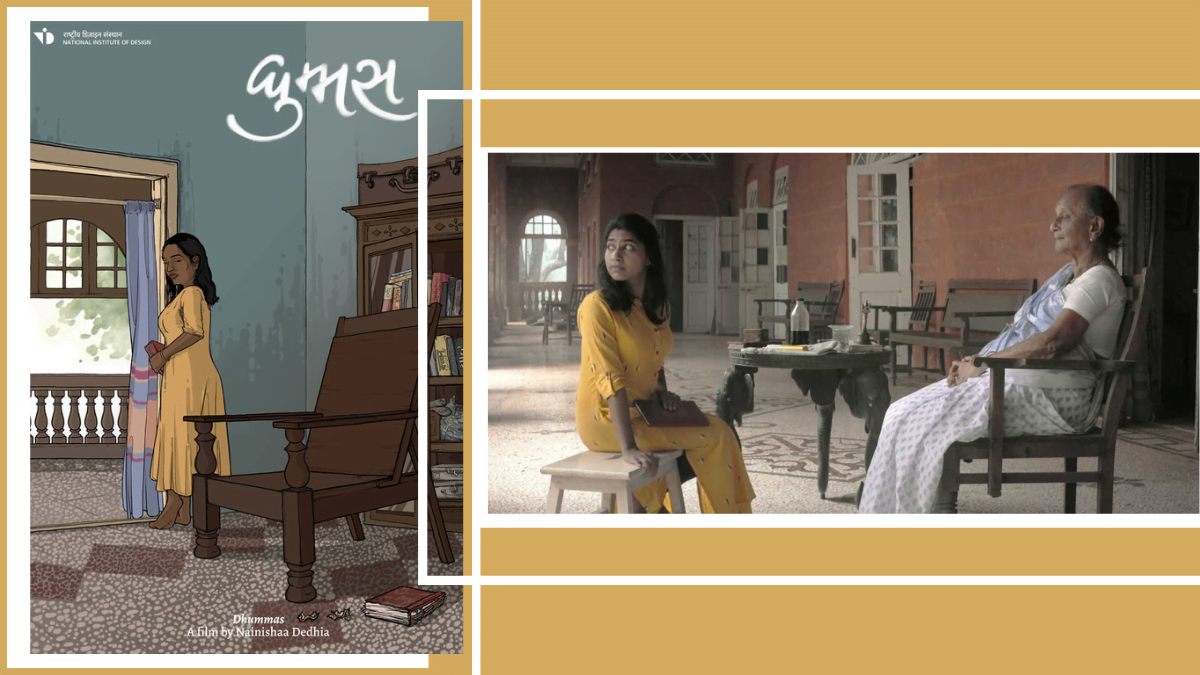As I begin to write this review of Dhummas, I’m reminded of one of the first shots in the film, where Mrinalini sits in front of her laptop struggling to start writing her review of Mahadevi Verma’s Links in our Chain. I think of how we are both women trying to learn from creations of other women. I think of how a chain is defined by its links—the same way our lives as women are defined to a great extent by the women who came before us—for good or bad. Dhummas is a portrayal of the effects of the bad chains, and the small acts that attempt to break them, successful or not.
The film is essentially a 20-minute conversation primarily between two women, one whose life is nearing its end and the other in whose life a new phase has just begun. Mrinalini is the newly married granddaughter-in-law of an old lady who has supposedly lost her memory. The latter spends her days on a recliner, rummaging through old books, looking for lost things—the former spends her days creating things which, as we see towards the end, may not be lost.
The old woman recounts stories from her youth and her love for poetry, literature and writing. She tells Mrinalini that, in fact, she met her husband for the first time while reciting a poem in front of Mahadevi Verma who had then blessed her. The grandmother-in-law had then gone on to continue writing in a tattered old diary that belonged to her husband that she had fixed with her own hands.
The film is essentially a 20-minute conversation primarily between two women, one whose life is nearing its end and the other in whose life a new phase has just begun.
The old woman tells Mrinalini that she had written three short stories before she was forced to stop—the first about a woman who had gone to jail for fighting in the independence struggle, the second about a woman who wrote award-winning stories under a male pseudonym for which her husband stole credit and the third and final one—she gets to that later.
Sensitive Portrayal of Woman-on-Woman Violence
The old lady was forced to stop writing because of her mother-in-law who believed that there was no use in a woman writing as her only jobs are to “cook and bear children.” Another time, her husband was travelling to Delhi with the rest of the family and she really wanted to visit Delhi as well, but could not because her mother-in-law said, “Who will take care of the house then?”
We see themes of woman-on-woman violence often, particularly the violence inflicted by mothers-in-law over their daughters-in-law (Saas-Bahu). In almost all the portrayals of this specific kind of violence, we see the blame squarely placed on the women without engagement with what goes into it. There is uncritical demonisation of women as independent oppressors with simultaneous erasure of men’s role in the same. Even the women who are shown to suffer are not shown as victims of patriarchy, but as victims of other women who are supposed to be inherently evil.
Only in women-led creations of recent times (Sharp Objects) do we see a more sensitive outlook which is also simultaneously critical of women who perpetuate patriarchy. Dhummas is one such creation. It does not obfuscate the role of men in the oppression of women (the grandmother-in-law tells Mrinalini that she wanted to name her first-born son something different from what her husband wanted but she chose to stay quiet because “why pick quarrels, it would be [her] child anyway”)—it makes clear its intent of just shining light upon women-on-women violence. It does not show women in a bad light just for the plot. We see this in how the old lady’s own mother encourages her interest in poetry when she recounts how it was her mother who asked her to recite the poem in front of Mahadevi Verma. We see the same in how the old lady treats Mrinalini—they seem to bond in what looks like their very first proper interaction.
Women, Mental Health and Age
Dhummas is a poignant tale of how women lose their entire lives to patriarchy and are ultimately left old and filled with regret. We are born with a burden that we spend our lifetime carrying and fighting at the same time—it even kills some of us, and for some lucky ones like the old lady, it takes our memories and leaves us.

The grandmother-in-law, presumably married at a young age, spent the majority of her life hiding and doing what she loved—writing. The psychological effects of having to hide your interest and talent in an entirely harmless activity can be debilitating as it was in the case of the grandmother-in-law. It can literally kill you. Not just that, it is passed on from generation to generation. This leaves us with a chain of psychologically stunted women who have to constantly fight oppression every way they turn. Intergenerational trauma has debilitating physical effects too—not just in the very direct way the film portrays—which is less often talked about. Dhummas dives into the mental health aspect of patriarchal oppression and it lingers for a long time after the credits roll.
Intergenerational trauma has debilitating physical effects too—not just in the very direct way the film portrays—which is less often talked about. Dhummas dives into the mental health aspect of patriarchal oppression and it lingers for a long time after the credits roll.
Yet the most heartbreaking aspect of it is perhaps the reality of a life not lived. The grandmother-in-law’s very small hopes and dreams for her life were shattered at every stage and it is deeply saddening to watch her old and frail recounting tiny parts of her life that made her happy. It makes you think of the billions of lives unlived before we came and the billions that will continue to be unlived as long as hierarchy exists. On a smaller and more personal scale, it makes you think of the kind of life you may have been able to live had it not been for the fact of your gender.
Also read: Film Review: Rajnigandha – A Woman’s Narrative Or Politics Of Appeasement?
Breaking The Chain – Quite Literally
There is nuance and symbolism apparent throughout the film. Dhummas manages to capture a lot in the span of 20 minutes without directly saying much—it portrays the intuitiveness and intelligence of the old lady in the scene where she smiles knowingly at the weather forecast which claims it won’t rain and how it ends up raining towards the end; it portrays the formation of a bond between Mrinalini and her grandmother-in-law by showing the former’s reluctance in being left alone with the latter in the first scenes (she asks Rajshri the house help to be back soon from the shop and even offers to go herself) in contrast with one of the last scenes where Mrinalini asks Rajshri to leave so that she can continue her conversation with grandmother-in-law.
It portrays the little acts of rebellion that women perform everyday in the scene where the old lady relishes a piece of candy despite her age (it also takes you to the line “desires. Small desires.” from Ormayude Njarambu by K. R. Meera, the story Dhummas is based on).
Yet, perhaps the most satisfying symbolism of all is in the last scene of the film. There are small scenes towards the beginning where Mrinalini’s unhappiness with her marriage and her new house is shown—she is shown busy in her work and we hear her husband calling out to her for tiny things he could fix himself and moving onto the next woman to fix the mess (the househelp Rajshri) when she doesn’t respond; her empathetic smiles at hearing her grandmother-in-law’s stories, and the fact that Mrinalini was writing a review of the revolutionarily feminist book by Mahadevi Verma, Links in our Chain.
In the last scene, we see Mrinalini literally breaking the chain—her mangalsutra.
Also read: Belated Film Review: Cocktail, Or No Country For Female Dosti
Dhummas (Haze) was created by an NID student, Nainisha Dedhia. It has won the Best Film Award at the Bengaluru International Short Film Festival (BISFF) and has qualified for the academy awards and will be sent as an entry. The Gujarati short film will also screen at the first-ever Tamil Nadu Independent Film Festival and the 40th VGIK International Student Festival in Moscow. Further, it will be shown at the 9th edition of Dharamshala International Film Festival and under the First Films category, Dhummas will compete with 17 titles for DIFF’s new Audience Award for Best First Film for short films.
About the author(s)
Hamsadhwani is a law student and anti-caste socialist feminist. Abolish the conditions that produce the prison.




